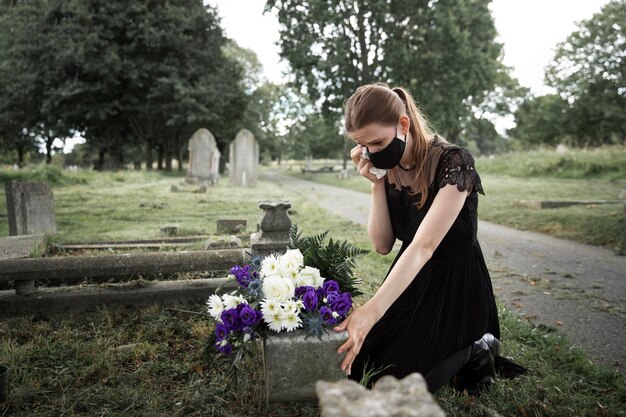

Most people think that contemplating their own death is inherently depressing. Why dwell on something so negative? Actually, there’s a good reason to do so: it can lead to increased happiness and personal growth.
A study conducted in the UK explored this idea. Participants were asked to think about death in an abstract way, think about their own death, or think about a toothache as a control. Afterward, they read an article on blood donations. Some read that blood donations were at record highs and there wasn’t much need for donations, while others read that donations were at record lows and the need was high. They were then given a pamphlet about fast registration at a blood donation center and were told to take one only if they intended to donate blood.
People who pondered death in an abstract way were more inclined to take a pamphlet if they read about a blood shortage. However, those who imagined their own death took a pamphlet regardless of the article they read, indicating their motivation to donate blood did not depend on how urgently it was needed.
Thinking about your own death makes you realize what’s truly important in life. This is one reason why the Buddha suggested regular reflection on death. It reminds us life is short, and the responsibility lies in how we choose to live our lives, focusing on meaningful aspects like helping others.
There’s a psychological theory called Terror Management Theory (TMT) that examines how people cope with the fear of death. Studies show that subtle reminders of death can make people more rigid, clinging to nationalism or religion. However, reflecting specifically on one’s own death, rather than death in general, has been shown to have positive effects. For example, thinking about the potential death of a spouse can make you appreciate them more and be less annoyed by their minor flaws.
When people think about death in a general sense, they tend to resist it, hoping it won’t happen to them. But when they accept the inevitability of their own death, they start focusing on what truly matters, asking themselves what they should do with the time they have left.
This kind of reflection is valuable for both existential and emotional reasons, and it can also spark important family conversations.
Nobody wants to die, even those who believe in an afterlife. Yet, death is an inevitable part of life. It’s life’s change agent, clearing out the old to make way for the new. Right now, the new is you, but eventually, you too will be cleared away. This might sound harsh, but it’s true.
In academic settings, like a Master’s in psychology, researchers explore how contemplating death affects human happiness. Current methods often involve imagining near-death situations, like being caught in a fire at a friend’s apartment. However, this might not be the same as reflecting on death itself.
If you’re looking to administer death contemplation, especially in a Buddhist context, the early teachings don’t provide detailed instructions on how to do this. They do, however, encourage reflection on aging, illness, and death as a natural part of life.
Typical reflections include understanding that we all age, fall ill, and eventually die. This awareness can be applied personally: recognizing that you are subject to aging, illness, and death, and acknowledging that you will inevitably be separated from everything you hold dear. Furthermore, understanding that you are responsible for your actions and will face their consequences, whether good or bad.
Through these reflections, we can better appreciate life and make more meaningful choices.
For those conducting studies, it might be beneficial to use a structured thought process or reflection prompts to ensure consistency and scientific rigor. While it’s valuable to let people explore these thoughts on their own, research often requires more controlled methods.
Reflecting on death can change our lives in profound ways, fostering deeper appreciation and driving us to focus on what truly matters.